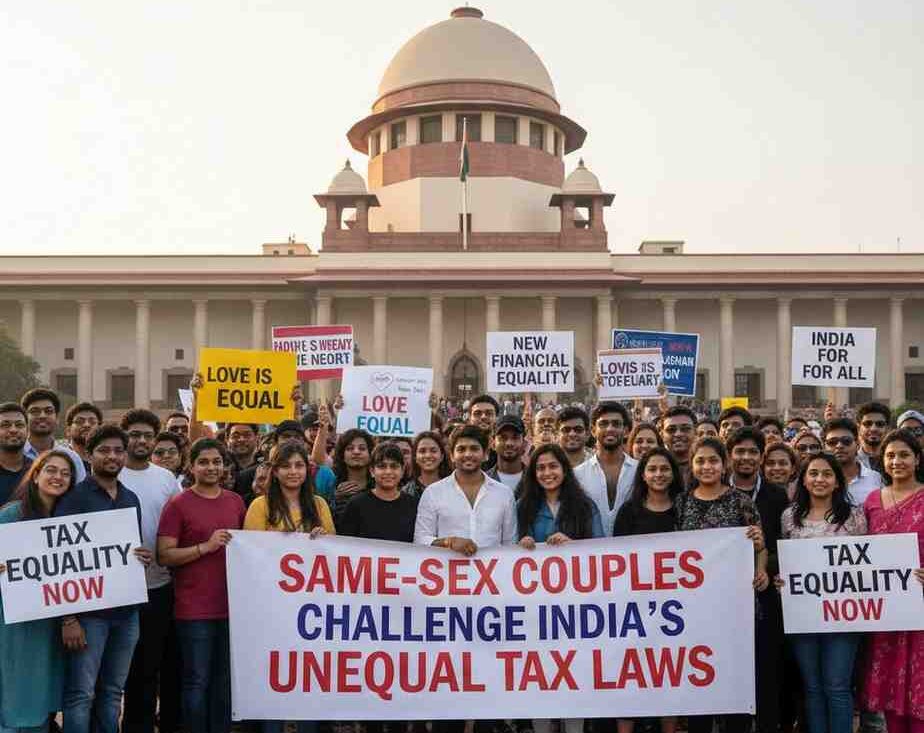Same-sex couples in India are challenging discriminatory tax rules that treat gifts between partners as taxable, unlike heterosexual couples. The case could redefine financial equality, tax law, and LGBTQ+ rights in India.
Introduction
In a significant development for LGBTQ+ rights and tax equality, a group of same-sex couples in India has approached the courts challenging what they call discriminatory provisions in the Income Tax Act. According to The Economic Times (October 2025), gifts exchanged between same-sex partners are taxed as “income from other sources,” while heterosexual couples in recognized relationships can claim certain exemptions. This legal challenge raises profound questions about financial fairness, constitutional equality, and the slow pace of reform in India’s post-377 era.
What Is the Legal Issue?
Under Section 56(2)(x) of the Income Tax Act, 1961, gifts above ₹50,000 received from non-relatives are taxable as “income from other sources.” The law defines “relatives” to include spouses, siblings, parents, and lineal ascendants or descendants — but not same-sex partners, since India does not yet recognize same-sex marriages or partnerships legally.
For heterosexual couples, even if unmarried, courts and assessing officers sometimes treat long-term partnerships as akin to a marital relationship for limited tax purposes (for instance, when cohabitation is evident or there is dependent status). However, same-sex couples receive no such recognition, leading to an inherent inequality in how the same transaction is treated under the tax code.
The Petitioners’ Argument
The petitioners contend that this tax treatment violates Articles 14 and 21 of the Constitution of India:
- Article 14 guarantees equality before the law and prohibits discrimination.
- Article 21 protects the right to life and personal liberty, which includes the freedom to live with dignity and make personal relationship choices.
They argue that taxing gifts between same-sex partners solely because their relationship lacks state recognition is arbitrary and discriminatory. The petition seeks a directive that same-sex partners be treated as “relatives” under Section 56(2)(x), or that the Central Board of Direct Taxes (CBDT) issue clarifying guidance to avoid such unequal treatment.
Government and Legal Response
As of now, the government has not issued an official statement on the petition. However, tax experts and human-rights lawyers note that this case could become a landmark test of how Indian tax policy adapts to evolving constitutional norms following the Supreme Court’s 2018 decision in Navtej Singh Johar v. Union of India, which decriminalized homosexuality.
Legal analysts suggest that while legislative reform may take time, the judiciary could direct interim measures—such as allowing exemptions in cases where partners are in proven, long-term domestic relationships.
Why This Matters
- Expanding the LGBTQ+ Rights Agenda
Earlier legal battles focused on marriage and identity recognition. This case shifts the focus to economic and fiscal equality, emphasizing that dignity extends to financial autonomy. - Tax Law Modernization
The Income Tax Act, drafted decades ago, doesn’t reflect the realities of diverse family structures. A favorable ruling could prompt broader tax-law modernization to recognize various forms of partnership. - Social Impact
Recognition in tax law signals state validation of same-sex relationships, potentially reducing stigma and improving access to shared assets, insurance, and estate planning.
Potential Outcomes
- Judicial Interpretation: Courts could read “spouse” or “relative” in a gender-neutral way, extending benefits to same-sex partners.
- Administrative Reform: CBDT could issue circulars clarifying tax exemptions for long-term domestic partnerships.
- Legislative Amendment: Parliament might amend Section 56 to explicitly include same-sex partners as relatives.
FAQs
What section of law is being challenged?
Section 56(2)(x) of the Income Tax Act, 1961, which taxes gifts received from non-relatives.
Why are same-sex partners treated differently?
Indian tax law ties exemptions to legally recognized relationships such as marriage, which same-sex couples currently cannot access.
How could this case affect future law?
A favorable judgment could compel lawmakers to redefine “relative” in tax statutes and acknowledge non-traditional partnerships.

























